Friday Degustation: lactose intolerant.
“Like being reborn…”
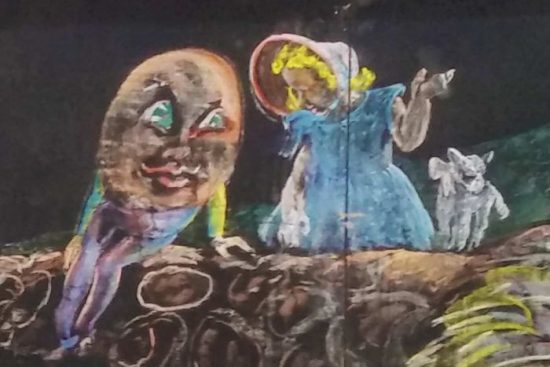
In one of the more unusual recent art stories is the strange tale of mystery art works. Workers renovating class rooms at Northcote Primary School in Melbourne removed chalk boards to find a series of large and detailed chalk drawings on the walls. Thinking they might be ‘significant’ the workers summoned Assistant principal Ross Bennie who immediately recognised the drawings for what they were – a mirror world of satanic creatures featuring images of the trapped souls of former pupils. According to the ABC, “Mr Bennie said some of the artworks had a more “sinister” air to them, including red-eyed rabbits in an Alice and Wonderland-inspired theme and goblins with pointy ears. “There’s one scene where there’s a number of children sitting around a campfire with pots and things like that and cauldrons,” he said. “Mr Bennie said the school hall, which was built around 1910, had undergone significant renovations over the years and speculated the artworks may have been created by a former teacher in the 1950s…”
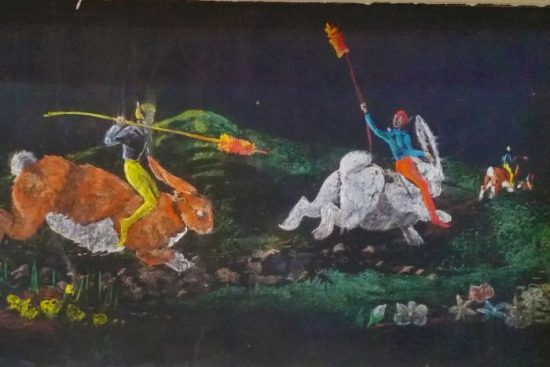
While everyone was freaking out, a kindly old Northcote teacher, now retired, named Elaine Hobbs came forward to reveal herself as the artist behind the works. [>] “She said she was asked to create the art in 1959 after the headmistress was impressed by the art she had drawn in her classrooms. “I was always illustrating, either on my own blackboard or on other people’s blackboards,” she said. Ms Hobbs said it took her about two weeks — and many sticks of chalk — to create the artwork in a bid to spruce up the school hall. “This is like being reborn, taken back to the way things were at that time, yes, it’s woken up a few memories,” she said. Mr Bennie said the school was keen to preserve the drawings and find a way to celebrate and display them in the future.” In an eerie postscript it was later revealed that an “Elaine Hobbs” had been killed in a car accident in Northcote in 1962, and although many children claimed to have seen her wandering the grounds of the school in later years, this was dismissed as an urban myth.
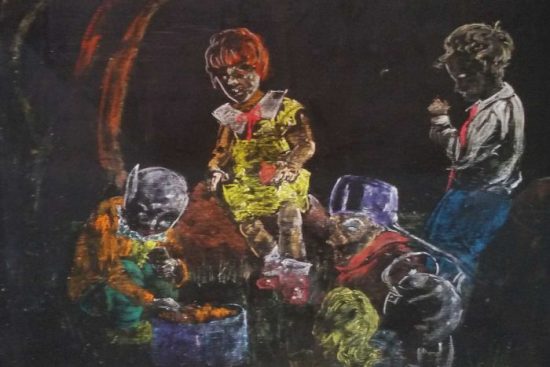
Astronaut
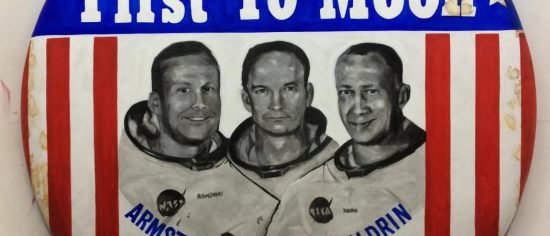
Tomorrow – July 20th, 2019 – marks the 50th anniversary of the first moon landing by Apollo 11. As we’ve noted [>] here before, there are a number of major exhibitions being staged around Australia to commemorate both the event and its long cultural influence. One of the larger shows comes from perhaps an unlikely location – Casula Powerhouse. The GIANT LEAP program that opened on July 1 is a multi-arts program of events and exhibitions that includes: Memories of the Moon Landing in the Marsden Gallery; High Loom large-scale installation in the Turbine Hall by Lisa Sammut; Future in the Upper Turbine Gallery; and, Under the Same Moon in the Hopper Gallery and fun, interactive activities in the Kids Gallery. Opening tomorrow is Astronaut which [>] “…considers space exploration from the perspective of the astronaut and represents an aspect of that experience. Featuring artists Adam Norton, Tony Albert, David Haines and Joyce Hinterding, Darren Sylvester, Mog&Mog and Chris Caines, the works combine the history and science of space travel with creative imaginings of exploring new territories.”
Apollo Memory
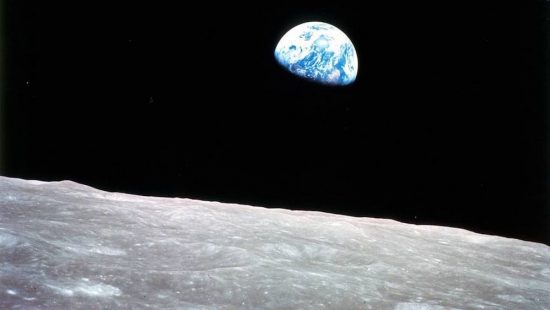
There’s also a huge amount of Apollo memorial stuff going on this week. The BBC World Service’s podcast [>] 13 Minutes to the Moon is a forensic examination of the final moments of the Apollo 11 landing, but this hugely detailed and archivally deep story also manages to take in the entire program from conception through to its conclusion with side stories on the birth of software programming, spacecraft design and development, as well as the pissed off commander of Apollo 7. For those who prefer pictures, SBS On Demand [and regular TV] has [>] Chasing the Moon, an exceptionally well made series that again covers the entire story with a deep dive into the televisual archive. If you’d prefer something a little less mediated, there are a series of rather good YouTube videos that reconstruct in real time [>] the Apollo descent and [>] the moonwalk.
Most media organisations look for a local angle to big news stories and Australia has a couple of legitimate claims to being part of history. While the film The Dish fictionalised the Australian involvement in the relay of transmissions from the Moon at the Parkes Radio Telescope, there was another story untold. As the Australian Geographic explains [>] “The Dish […] omits the pivotal role of NASA’s Honeysuckle Creek Tracking Station, about 300km south of the Parkes Observatory, near Canberra. Honeysuckle provided the historic live footage of Neil Armstrong steppi ng onto the Moon that was seen by more than 600 million people worldwide at 12.56pm (AEST) on Monday 21 July 1969…”
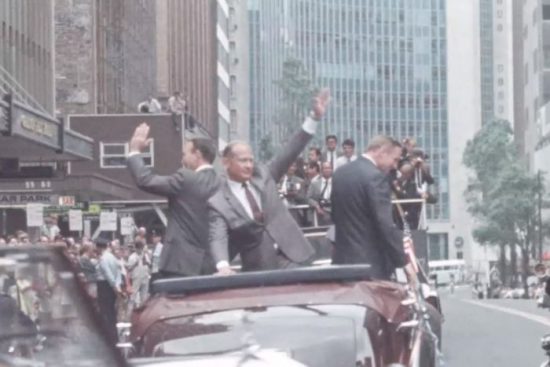
Meanwhile the ABC has dug up some archive of the Australian visit of the three Apollo astronauts following their return to Earth. [>] “They were the three most famous men on the planet in 1969, but this footage of the Apollo 11 astronauts touring Australia has excited film archivists for another reason. Neil Armstrong, Buzz Aldrin and Michael Collins are shown parading through the streets of Sydney on the back of an open convertible surrounded by a sea of beehive hairdos and US flags. ABC film archivist Helen Meany said she was shocked to find the footage was shot on colour film. “It’s really unusual for our collection because at that point, colour TV was still six years away,” she said.”Whoever it was who decided to head out with reels of colour film stock that news crews wouldn’t regularly use until the mid-’70s on that day must have had a sense of the significance of their visit and thinking long-term about how the ABC might use the footage in the future. “Ironically, I don’t think it has been used at all.”
And for all those heartily sick of the whole thing, let’s not forget The Onion’s reporting of these historic events…
Hidden Faces
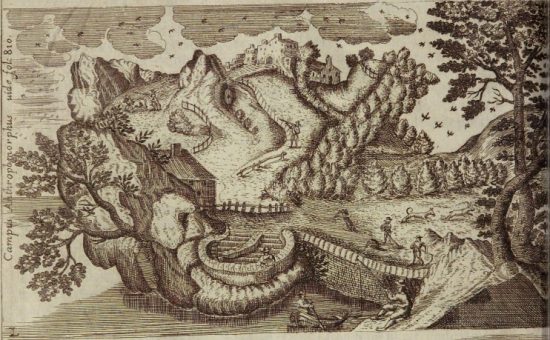
The emergence of the landscape as a subject for Western European painting – as distinct from simply serving as the background for human figures – is generally dated to the late medieval, early renaissance period. Although later codified into a distinct genre in the 17th and 18th centuries, there’s a curious phase of works that melded both the landscape and human form into one, a kind of pre-modern meme which saw a bearded male face constructed from hills, trees and rocks. In a fascinating post on Public Domain Review, a collection of these works suggest a transitional period in landscape painting. [>] “Perhaps an interesting quirk of this “transition” were the images which seemed to fuse the two: anthropomorphic landscapes. These images — particularly where landscapes are given the form of human heads — appear to be somewhat of a meme of the 17th century, with examples cropping up again and again, especially in Netherlandish painting.”
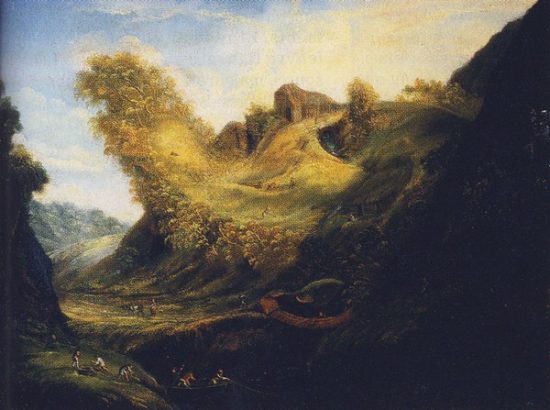
[>] “One of the most popular versions of the anthropomorphic landscape is the depiction of a bearded man, horizontal in rocky profile. The beginnings of this can be traced back to an image created by the great 17th-century polymath Athanasius Kircher, featured in his Ars magna lucis et umbrae (1645/6). Kircher’s design is said to have been inspired by a story related by Vitruvius about the 4th-century-BC architect Dinocrates’ plan to sculpt into Mount Athos a colossal image of Alexander the Great, who would hold a small city in one hand and with the other pour a river into a sea by means of a gigantic pitcher. Kircher’s more modest rendering — involving only a face rather than full body — was to be copied and riffed-upon many times over the next decades, including by Wenceslas Hollar, who in his rendition trims the “beard” and “hair” for a general smarter appearance…”
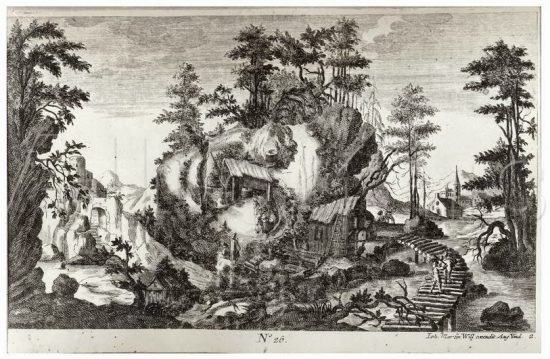
Follow: @trevorpaglen
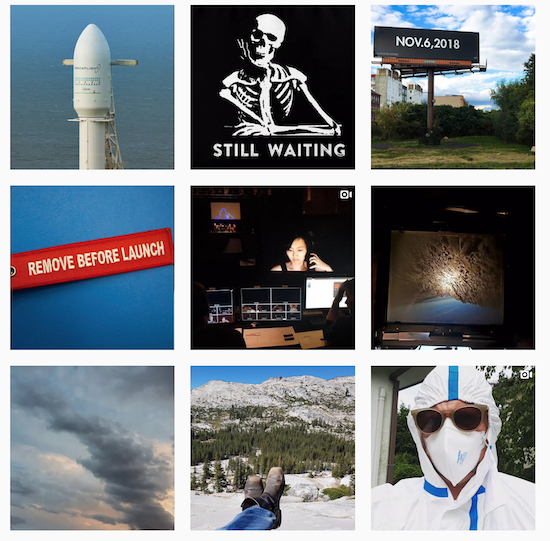

Between launching ill-fated satellite art works, collaborating with the Kronos Quartet, or pushing the art of photography beyond its limits, Trevor Paglen‘s Instagram account @trevorpaglen is evidence that the US artist is one of the most interesting multi-media practitioners out there…
You’re a creative, and you like Tasmania!
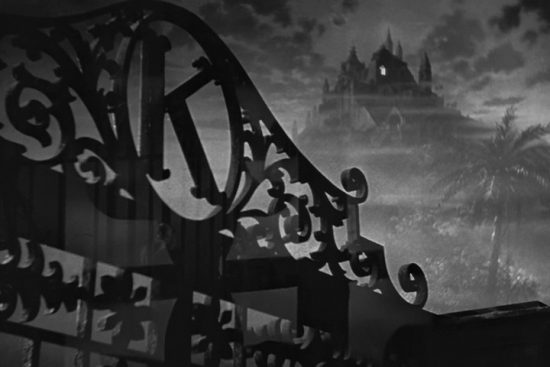
In their inimitable style, the Museum of Old and New Art [which is located in Hobart, in Taswegia, the state formerly known as ‘Tasmania’] is looking for an advertising creative to join their team. In what seems like the opening pages of one of JG Ballard‘s later novels, MONA is calling for the creative to move down to Hobart to be come part of eccentric millionaire David Walsh‘s staff to while away their days coming up with crazy ideas, and then presumably drive around at night in a convoy of black SUVs and… well, you know the rest. To wit:
Deep Fake Shining
Last week we [>] posted a link to the first instalment of what has turned out to be a viral hit – a [>] Deep Fake remake of Kubrick’s The Shining, replacing Jack Nicholson with Jim Carey. Now part two has been posted, a reimagining of the iconic baseball bat scene by anonymous video pranksters Ctrl Shift Face. What makes these videos so compelling is that the fakery is of a very high standard [perhaps because the shape of Nicholson and Carey’s faces are in many ways so similar], but also because this feels like an entirely plausible replacement.
Assorted Links
‘It took a lot of guts’ [>] Tracey Moffatt’s eerie new portals
“With a new Federal Minister for the Arts, it’s time for a bigger vision for our creative sector including First Nations representation, deeper education and involvement at all levels of government” [>] Why we need a bold national vision for culture and creativity
Sony’s ‘Walkman Wall’ exhibit [>] celebrates 40 years of the music player
“As Simon Denny sees it, data could radically alter the curatorial networks that sustain the art world—for better or for worse” [>] The Future of Art
How to [>] Crochet a Vulva Tea Cosy
A complicated copyright case is nearing its conclusion as [>] artist Cady Noland refuses to give up her legal fight over the restoration of her disavowed Log Cabin sculpture
Sobering Reality Check [>] AIs named by AIs
“More than 15 years ago, a young indie folk artist set a course to traverse the United States of America through song, accruing acclaim, a fan base, and lots of anticipation along the way. Or did he?” [>] Sufjan Stevens and the Curious Case of the Missing 48 States

